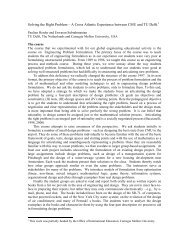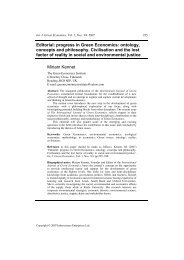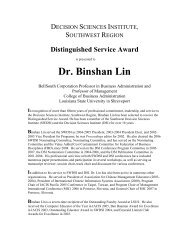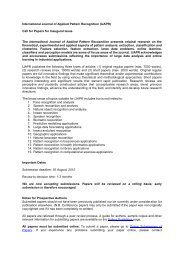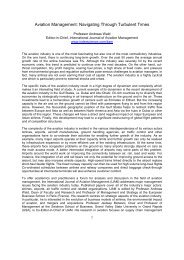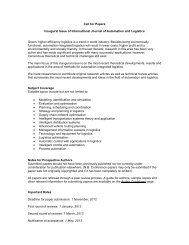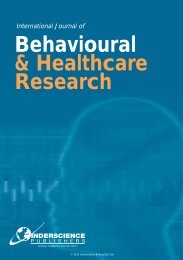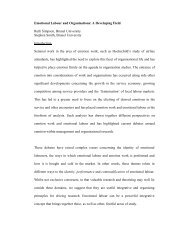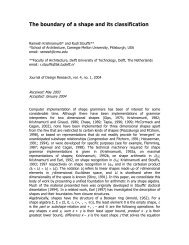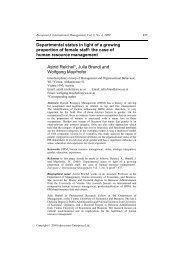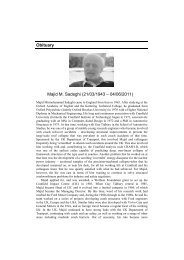A new Zeitgeist for international business activity and ... - InderScience
A new Zeitgeist for international business activity and ... - InderScience
A new Zeitgeist for international business activity and ... - InderScience
You also want an ePaper? Increase the reach of your titles
YUMPU automatically turns print PDFs into web optimized ePapers that Google loves.
282 J.H. Dunning<br />
• Health matters have been also brought to the <strong>for</strong>e, partly as a result of the scourge of<br />
HIV <strong>and</strong> AIDS; but, more generally, because of the easier spread of infectious<br />
diseases (e.g., Asian flu), <strong>and</strong> of a greater awareness of huge differences in the<br />
provision of health care across national boundaries. New challenges are also being<br />
posed by an ageing population in several parts of the world, (one notable exception is<br />
India), <strong>and</strong> of the growing percentage of GDP allocated to medical treatment<br />
(Birkinshaw <strong>and</strong> Hood, 1998; Birkinshaw, 2001).<br />
What about <strong>new</strong> issues specific to IB? We might identify four of these.<br />
First the widening geography of IB <strong>activity</strong>. The emergence of South <strong>and</strong> East Asian<br />
developing countries as global players is a case in point. Between 1990 <strong>and</strong> 2005, these<br />
countries increased their combined inward <strong>and</strong> outward <strong>for</strong>eign direct investment (FDI)<br />
stock by 9.3 times compared with 5.8 times in the case of all countries (UNCTAD, 2006).<br />
Second a host of <strong>new</strong> <strong>for</strong>ms of FDI. These range from equity management investment<br />
(estimated to have accounted <strong>for</strong> a quarter of the cross border M&As in 2004–2005<br />
(UNCTAD, 2006) to born global ‘start up’ companies, to st<strong>and</strong>-alone family <strong>business</strong>es<br />
(especially in Asia <strong>and</strong> China), <strong>and</strong> to a <strong>new</strong> array of non-equity collaborative <strong>and</strong><br />
networking arrangements. Inter alia these developments not only point to an increased<br />
blurring of the boundaries of firms; but the fact that FDI data are becoming a less reliable<br />
indicator of the extent, <strong>for</strong>m <strong>and</strong> likely impact of global MNE <strong>activity</strong>.<br />
Third, a combination of shared technologies <strong>and</strong> <strong>business</strong> st<strong>and</strong>ards is helping to<br />
refocus the process of corporate globalisation from products to production. In the words<br />
of the President <strong>and</strong> Chief Executive of IBM<br />
“the emerging globally integrated enterprise is a company that fashions its<br />
strategy, its management <strong>and</strong> its aspirations in pursuit of a <strong>new</strong> goal: the<br />
integration of production <strong>and</strong> value delivery worldwide.” (Palmisano, 2006,<br />
p.129)<br />
Fourth, the increasing importance of asset augmenting IB <strong>activity</strong>, e.g., through the<br />
<strong>for</strong>mation of <strong>new</strong> alliances, networks <strong>and</strong> other modalities, <strong>for</strong> tapping into, <strong>and</strong> learning<br />
from, <strong>for</strong>eign sources of resources, capabilities, markets <strong>and</strong> institutions. In short, IB is<br />
no longer best thought of as an amalgam of exports, FDI <strong>and</strong> collaborative ventures; but<br />
of a system of interconnected cross-border value-creating <strong>and</strong> value-exploiting activities.<br />
3.2 A <strong>new</strong> mindset<br />
But do these issues – important as they are – signify a <strong>Zeitgeist</strong> <strong>for</strong> IB <strong>activity</strong> <strong>and</strong> IB<br />
scholarship? Probably not. So let us turn to our second ingredient of change.<br />
This suggests that, owing inter alia to the evolving characteristics of the world scenario<br />
earlier described, both the intentions <strong>and</strong> choices of individuals <strong>and</strong> organisations, <strong>and</strong><br />
their perceptions of the ways in which these might best be advanced, have undergone<br />
a fundamental change. These aspects of the <strong>new</strong> <strong>Zeitgeist</strong> we refer to as a <strong>new</strong> mindset.<br />
The key rationale <strong>for</strong> this <strong>new</strong> mindset arises from the advent <strong>and</strong> impact of<br />
globalisation, the character <strong>and</strong> complexity of technological advances <strong>and</strong> the<br />
multicultural composition of the <strong>new</strong> players. Each in its way brings more uncertainty,<br />
insecurity, <strong>and</strong> volatility. Each leads to a questioning of the appropriateness of existing<br />
mindsets, particularly in respect of those of decision takers in large <strong>and</strong> integrated<br />
MNEs. 3 Each too, challenges the ability of extant institutions to cope with the dem<strong>and</strong>s<br />
of emerging global markets. In particular, attitudes towards the purposes <strong>and</strong> ingredients




